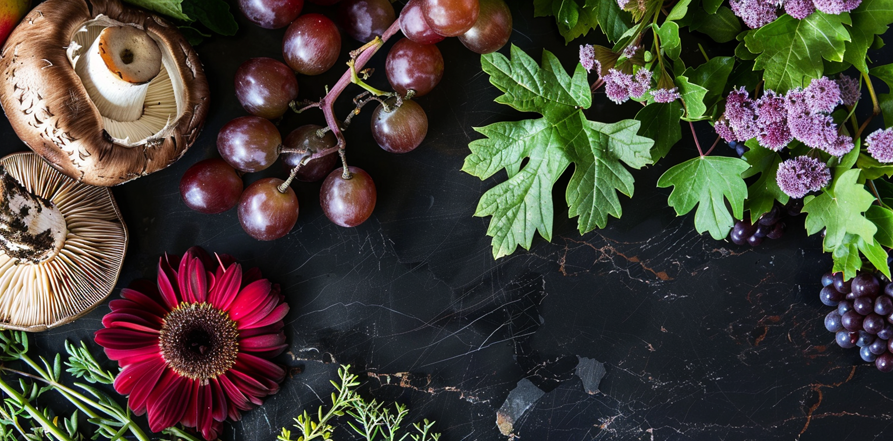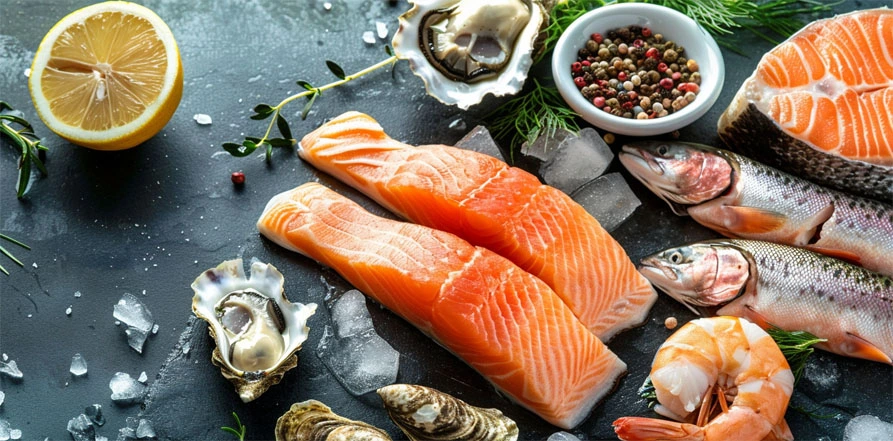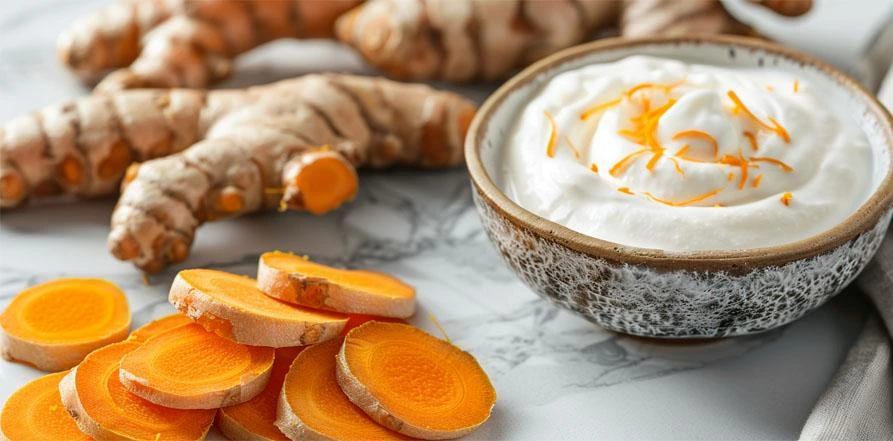By Donnie Yance
Traditional Herbal Medicine (THM) is very different from using isolated plant compounds. Using isolates to treat cancer is a more allopathic approach and not at all part of a holistic whole-systems model based in THM practice.
THM is based on a concept of whole plants having synergy as well as intelligence (Plant Intelligence). Examples of plant intelligence include key features that involve the ability to problem-solve in a flexible manner, anticipate the future, store memory, learn, communicate, and ultimately, be goal-oriented.1
Traditional Herbal Medicine and Natural Killer Cells for Cancer Patients
Traditional Herbal Medicine (THM) represents a powerful yet often overlooked approach to cancer treatment, particularly through its ability to enhance the body’s natural immune responses. Research has shown that THM can strengthen natural killer (NK) cells, which are crucial for fighting tumors and improving cancer survival rates.
The Immune System Enhancement THM offers has several key benefits:
- Boosts natural killer (NK) cell activity
- Enhances overall immune system function
- Supports the body’s natural defense mechanisms
- Improves cancer survival rates
- Provides natural immunomodulatory properties.
The Current Medical Paradigm- Despite THM’s potential, several barriers to the acceptance of plant medicine exist in conventional medicine:
- Institutional bias against herbal treatments
- Limited integration with conventional therapies
- Resistance to holistic approaches
- Focus on isolated treatments rather than whole-system healing
Contemporary cancer treatment often overlooks two crucial factors:
- The Host’s (Patient’s):
- Individual immune system status
- Overall health condition
- Personal healing capacity
- Genetic and environmental factors
- The Microenvironment:
- Complex interactions between host and cancer
- Cellular and molecular environments
- Immune system responses
- Metabolic conditions.
A New Understanding Is Needed
The optimal future of cancer treatment requires:
- Integration of traditional and modern approaches
- Recognition of herbal medicine’s immunomodulatory properties
- Understanding of complex interactive mechanisms
- Balance between targeting cancer and supporting host health
- Consideration of the complete biological environment.
Moving beyond the current model’s limitations of focusing solely on toxic therapies, we must embrace a more comprehensive approach that considers both the patient’s overall health and the complex interactions within their internal environment. This integration could revolutionize immunotherapy and provide more effective holistic cancer treatments.
Just from the narrow perspective of the impact of herbal medicine on the immune system, natural compounds from plant medicines act on different cells including: cancer cells, T cells, dendritic cells (DCs), regulatory T cells (Tregs), and myeloid‐derived suppressor cells (MDSCs), to present anticancer activities via multiple targets.
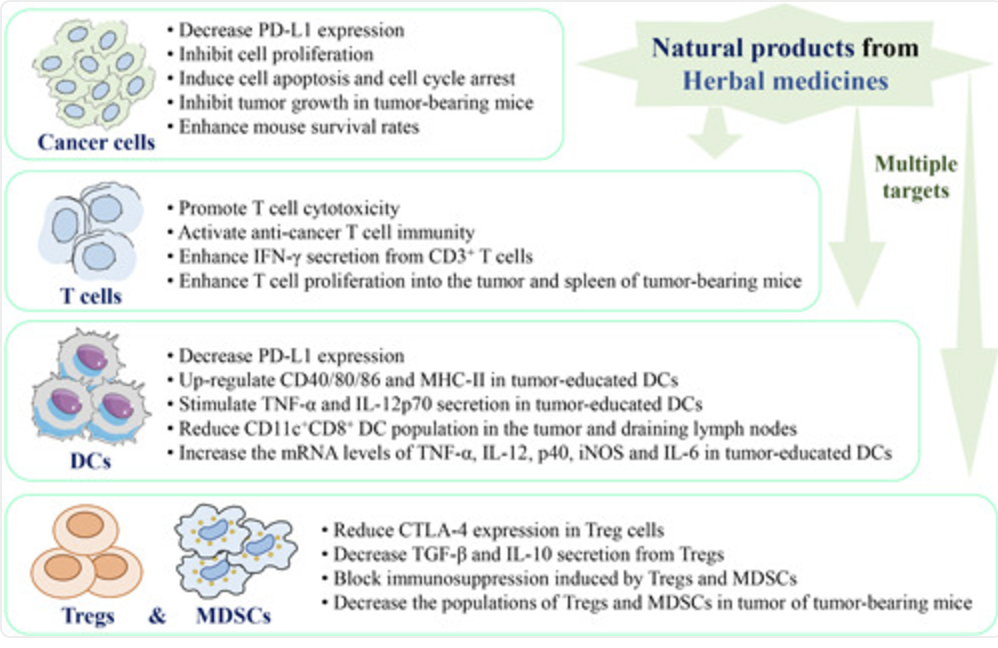
There is no doubt that combined treatment with immunotherapy, specifically immune checkpoint inhibitors, produces improved clinical outcomes for cancer patients.2
A comprehensive review of scientific studies to understand this connection better was conducted. In this review study, Cochrane analyzed randomized controlled trials (RCTs) from four major medical databases, examining research published through October 2015. The focus was on understanding how oral herbal medicine affects NK cells in cancer patients.
This review found 16 high-quality clinical trials with a total of 1,326 cancer patients. When patients combined traditional herbal medicine with conventional cancer treatments, they showed notably higher levels of NK cells compared to those receiving conventional treatments alone.3
Key Herbal Immunomodulators and Their Cancer-Fighting Properties
One of the great advantages of herbal medicine is its ability to redirect the immune system to target the cancer which often involves both the activation and enhancement of specific cells.
Examples of Medicinal Mushrooms used to support cancer patients:
- Reishi (Ganoderma lucidum): Increases natural-killer cell activity and enhances T-cell function. Studies show it can complement chemotherapy by reducing side effects while boosting immune response.
- Turkey Tail (Trametes versicolor): Contains PSK, approved in Japan as a cancer treatment. It works synergistically with conventional treatments by increasing survival rates, particularly in breast, gastric, and colorectal cancers.
- Cordyceps: Stimulates both innate and adaptive immunity while protecting bone marrow from chemotherapy damage.
Reishi Mushroom (Ganoderma lucidum or Lingzhi)
“Lingzhi is a miraculous king of herbs”—Chinese people (221–206 BC).
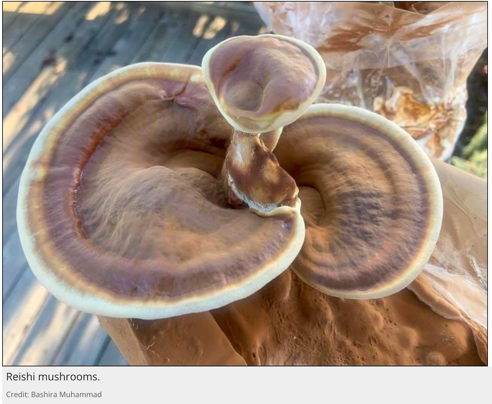
Historically, the Romans considered mushrooms in general as the food of their gods and only served them for great feasts, while the Greeks and the Vikings believed that eating mushrooms gave them strength and enthusiasm before war.
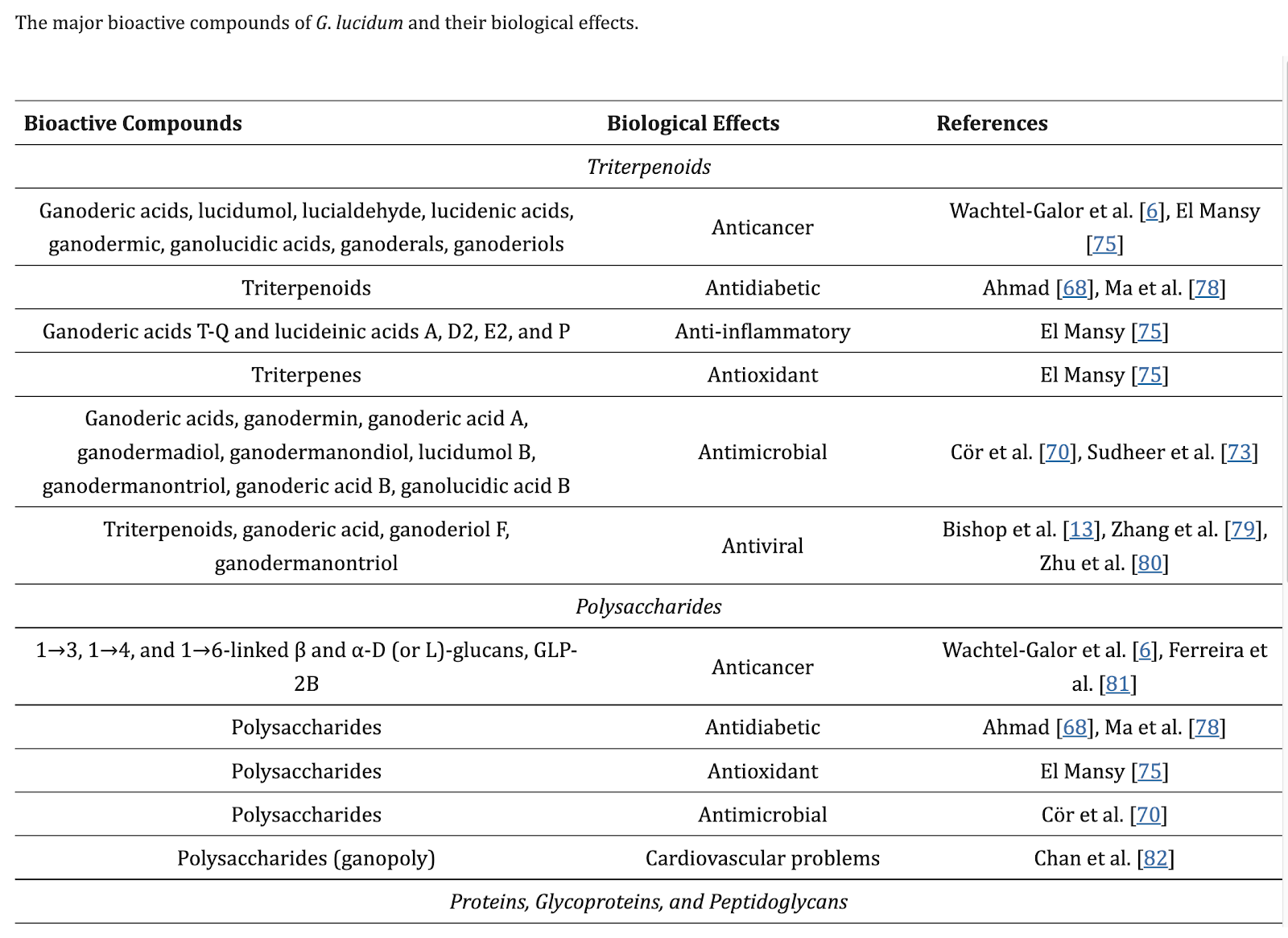 4
4
Reishi extract has been found to promote the maturation and activation of immune system cells such as T cells, natural killer cells, dendritic cells, and macrophages.5,6,7,8,9,10,11,12
Tumor-educated dendritic cells (TEDCs) involved in tolerance induction have attracted much attention recently. Treatment with β-glucan drastically decreased the levels of regulatory T cells but increased the infiltration of macrophages, granulocytes, and TEDCs in tumor masses, and thus elicited Th1 differentiation and cytotoxic T-lymphocyte responses and led to a delay in tumor progression. 13, 14
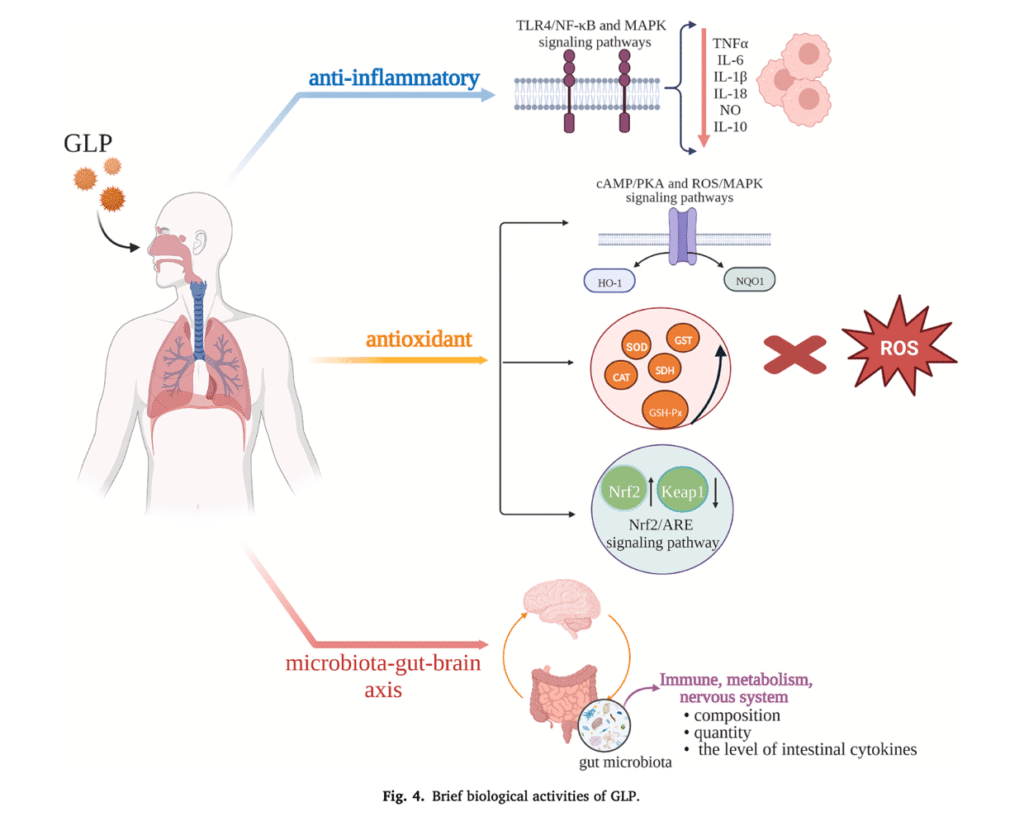
Beta glucans in Reishi mushrooms increase NK cells and IgA in mice. 15
Researchers also found that the molecules from Reishi mushroom alter the composition of gut bacteria in mice that were fed a high-fat diet. After consuming the extract, the mice’s community of gut bacteria resembled that of lean mice in the study that were fed their normal diet, rather than the gut bacteria of the mice fed the high-fat diet but no extract.
“A major part of the anti-obesity effects of Reishi appears to be due to this modulating effect on the composition of the gut microbiota,” said Hsin-Chih Lai, of Chang Gung University.
Moreover, when the researchers in the new study took gut bacteria from the feces of the mice that had consumed the mushroom extract, and transplanted those bacteria into the guts of obese mice that had not been treated with the extract, they found that, “the composition of their bacteria changed to a more beneficial one” 16 Several other recent studies have confirmed the findings of this study.17,18,19
Reishi extract impairs breast cancer stem cells by targeting the STAT3 pathway.20
Cyclophosphamide (CTX) is a chemotherapy agent that causes myelosuppression (bone marrow suppression). Reishi extracts enhanced immune cells to secrete more cytokines and restore the bone marrow cell (BMC) counts and peripheral hemograms reduced by CTX, The beneficial effects induced by the Reishi extract were not seen to have any toxic or other side effects. Reishi extract boosted hematopoietic progenitor cells, bone marrow stromal cells (BMSC), secretion of hematopoietic regulation factors, and potentiated CTX in inducing apoptosis of cancer cells.21
Another study showed that 100 mg/kg/day of Reishi extract administration significantly alleviated CTX-induced immune damage by improving immune organ indexes, earlap swelling rate, the index of carbon phagocytosis and clearance value, secretion of cytokines TNF-α, IFN-γ, and IL-2, and IgA in the mice.22
In a model of lung metastasis, orally administered Reishi extract increased the population of CD8 + T cells and IL-6 cytokine levels in mouse blood, while also enhancing the activity of natural killer cells in the spleen. The combination of Reishi and CTX effectively suppressed the lung metastasis of circulating breast cancer cells, alleviated CTX-induced weight loss, and reduced the ratio of lung and spleen weight to body weight in mice.23
Reishi Mushroom’s Impact on Obesity Through Gut Microbiota Modulation
A groundbreaking study published in Nature Communications24 demonstrates that Ganoderma lucidum (Reishi) exhibits significant anti-obesity effects through its ability to modulate the gut microbiome. This research, conducted by scientists from the University of the Pacific School of Dentistry and Chang Gung institutions in Taiwan, reveals how specific mushroom compounds can prevent and potentially reverse obesity-related symptoms.
Weight Management Effects
- Mice on a high-fat diet supplemented with Reishi extract showed 25% less weight gain compared to control groups
- The mushroom’s effects were observed even in the presence of continued high-fat food consumption
Metabolic Improvements
The study documented multiple beneficial effects:
- Prevention of fat tissue development
- Reduction in gut inflammation
- Decreased levels of harmful bacteria in the bloodstream
- Enhanced insulin sensitivity
Mechanism of Action
The researchers identified polysaccharides as the key bioactive compounds responsible for these effects. These complex carbohydrates work by:
- Modulating the gut microbiota composition
- Specifically altering the firmicutes-to-bacteroidetes ratio, a key indicator of gut health
- Creating a more favorable bacterial environment that supports metabolic health
The research demonstrates that Reishi mushroom’s polysaccharides could represent a novel approach to managing obesity through microbiome modification, opening new avenues for therapeutic interventions targeting metabolic disorders.
Examples Of Herbs Used To Support Cancer Patients
- Echinacea: Potent NK and T-cell booster, classic alterative used traditionally for immune system related diseases.
- Astragalus: Restores compromised immune systems during chemotherapy. Research shows it can enhance the effects of platinum-based chemotherapy while reducing side effects.
- Turmeric: Its active compound, curcumin, not only fights inflammation but also makes cancer cells more visible to the immune system. Can increase the effectiveness of certain chemotherapy drugs.
- Green Tea: EGCG compounds support T-cell function and can enhance the effectiveness of modern immune checkpoint inhibitors.
- Resveratrol (most concentrated in Japanese knotweed, Grapes, and Blueberries): Epigenetic modification, immune support
- Berberine (most abundant in coptis, goldenseal, barberry, and Oregon grape): Direct cytotoxic effects, as well as the ability to lower lipids and glucose. Supports a healthy microbiome.
Echinacea: Miracle Herb against Aging and Cancer?
Actions: Immune modulation, enhances NK cells, normalizes Th1 and Th2 cytokine production, Anti-hyaluronidase, Mediates apoptosis/cytotoxic effects. Echinacea’s immune-modulatory effects include increased cytotoxic T-cell cytokine response, boosts IL-2 and IFN-alpha. It decreased the number and function of T-regulatory cells, in association with the enhanced feeder function of CD4 antigen-presenting cells. 25, 26, 27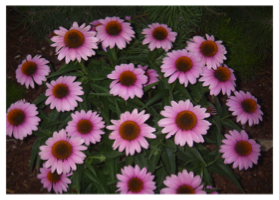
Results of five years of extensive research showed that daily consumption of Echinacea significantly extended lifespan in healthy mice and mice with leukemia. 28
Echinacea purpurea Extract Enhances Natural Killer Cell Activity In Vivo

Resveratrol
Resveratrol has a wide array of benefits for cancer support; among other things it exerts these effects:
- Triggering Apoptosis (Programmed Cell Death)
- Inhibition of Cell Proliferation
- Anti-Inflammatory Effects
- Inhibition of Angiogenesis (Blood Vessel Formation)
- Suppression of Metastasis and Invasion
- Enhancement of DNA Damage and Repair Inhibition
- Modulation of Epigenetic Mechanisms
- Synergistic Effects with Conventional Therapies
Regarding the immune system, Resveratrol targets T-cell activation in a bidirectional manner.
If the immune system is overactive, it down-regulates CD4+ T-cell activation in autoimmune disease
If the immune system is underactive due to Regulatory T cells (T-regs), it can make cancer worse because they inhibit the body’s ability to recognize and attack cancer cells. Resveratrol diminishes this immunosuppressive function of T-regs allowing the immune system to do a better job at attacking cancer cells.
Resveratrol strongly modulates the immune response including the activity of NK cells.
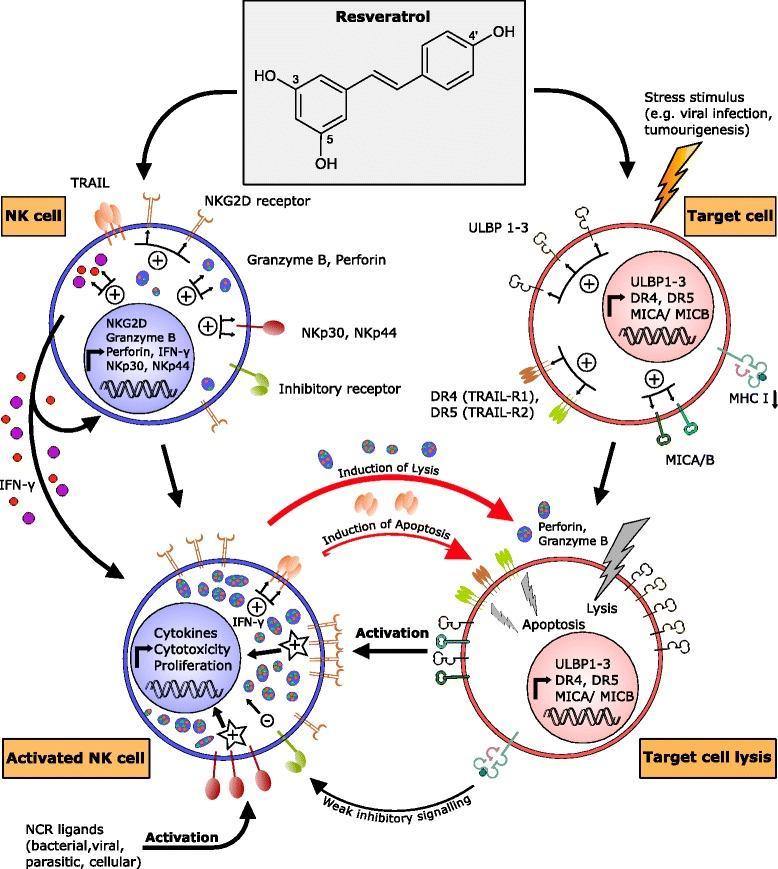
Green Tea Encourages Growth of Akkermansia muciniphila
Green tea is one of the most well-studied anticancer herbs in the world. In addition to its known effects, new research has come to light about its effects on the microbiome. Trillions of microorganisms reside in the hosts’ gut. Since diverse activities of gut microbiota affect the hosts’ health status, maintenance of gut flora is important for maintaining human health. Green tea (GT) has multiple beneficial effects on energy metabolism with antiobesity, antidiabetic, and lipid-lowering properties. As GT contains a large amount of bioactive ingredients (e.g., catechins), which can be metabolized by microorganisms, it would be feasible that consumption of GT may cause compositional changes in gut microbiota, and that the changes in the gut biome would be associated with the beneficial effects of GT.
A 2020 study demonstrated that GT significantly encouraged the growth of Akkermansia muciniphila, a beneficial bacteria that helps relieve obesity and related metabolic disorders. Akkermansia also plays a crucial role in cancer prevention and treatment by reinforcing the gut barrier, modulating the immune system, reducing inflammation, and enhancing the efficacy of immunotherapy. It was found that epigallocatechin gallate (EGCG) is the component of GT that stimulates the growth of Akkermansia. It is assumed that EGCG in green tea acts as a prebiotic agent to nourish Akkermansia.
Berberine
Berberine is a bitter bright-yellow alkaloid that stimulates pathways in the body associated with fasting, making it a fasting mimetic. It has proven benefits on metabolic health, including lipid-lowering, anti-obesity, and glucose regulating effects.
Studies conducted in rodent models suggest that berberine is extremely effective at bolstering levels of Akkermansia in the gut in a dose-dependent manner, and that this effect is partially responsible for its health benefits.
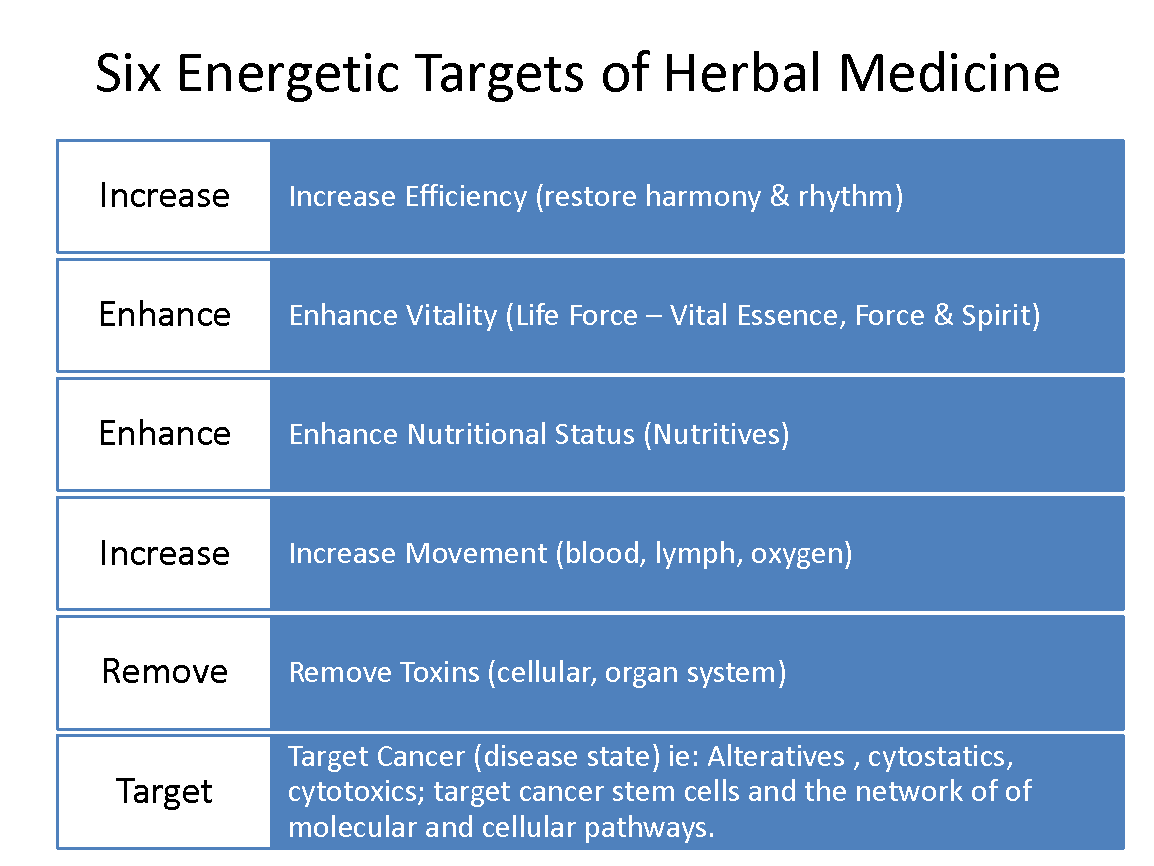
Herbal Integration Guidelines
- Always consult an expert clinician in herbal medicine, such as a Mederi Care practitioner, before combining herbs with conventional treatments
- Use only high-quality herbal formulations from trusted sources, standardized, and tested for quality and potency
- Time herbal protocols around treatment schedules for optimal benefit.
Timing of Herbal Protocols with Treatments
This approach divides supplemental support into two distinct phases, aligned with chemotherapy or immunotherapy treatment intervals (typically 2-3 week cycles).
Phase 1: Building Resilience (Week 1)
Focus: Strengthening overall system resilience before next treatment
- Primary Components:
Adaptogenic herbs
Tonic herbs
System-strengthening supplements
Phase 2: Targeted Support & Detoxification
Focus: Supporting treatment efficacy and managing side effects
- Primary Components:
Target-specific compounds
Alterative herbs
Lymphatic support herbs
Cytostatic botanical compounds
Organ-specific detoxification support
Treatment Cycle Examples
2-Week Treatment Cycle
- Days 1-7: Phase 1- Building Resilience
Emphasis on adaptogenic and tonic support
- Days 8-14: Phase 2: Targeted Support & Detoxification
Transition to detoxification and specific support
3-Week Treatment Cycle
- Days 1-10: Phase 1- Building Resilience
Extended adaptation and strengthening period
- Days 11-21: Phase 2: Targeted Support & Detoxification
Intensified detoxification and specific support
Protocols should be adjusted based on:
- Individual patient response
- Specific treatment regimen
- Treatment side effects
- Patient’s overall constitution
- Concurrent medications
Conclusion
The future of cancer treatment likely lies in combining the best of both worlds: the sophisticated, targeted approach of modern immunotherapy with the gentle, system-wide support of traditional holistic medicine. This integration could help overcome cancer’s immune-evading abilities while supporting the body’s natural healing processes.
Traditional Herbal Medicine offers a powerful and holistic approach to cancer treatment by enhancing the body’s natural immune defenses. Unlike isolated compounds used in allopathic medicine, THM works synergistically with the body, supporting natural killer (NK) cells and other immune functions to improve cancer outcomes. Research demonstrates that medicinal mushrooms, herbs like Echinacea and Astragalus, and plant compounds such as resveratrol and berberine can modulate the immune system, reduce side effects of conventional treatments, and even influence gut microbiota for overall health benefits.
Integrating holistic medicine with conventional cancer therapies can lead to a more comprehensive and effective approach to treatment. By recognizing the intelligence and synergy of whole plants, future cancer care can move beyond toxic therapies and embrace a model that supports both the patient’s immune system and total quality of life.
About the Author:
Donald R. Yance is the founder of the Mederi Center. A Clinical Master Herbalist and Certified Nutritionist, Donnie is renowned for his extraordinary knowledge and deep understanding of the healing properties of plants and nutrition, as well as of epigenetics, laboratory medicine, oncologic pathology, and molecular oncology. He is a professional member of the American Herbalists Guild, National Association of Nutrition Professionals, Academy of Integrative Health and Medicine, and the Society for Integrative Oncology.
References:
1. Trewavas A. The foundations of plant intelligence. Interface Focus. 2017;7(3):20160098. doi: 10.1098/rsfs.2016.0098.
2. Zhong Z, Vong CT, Chen F, Tan H, Zhang C, Wang N, Cui L, Wang Y, Feng Y. Immunomodulatory potential of natural products from herbal medicines as immune checkpoints inhibitors: Helping to fight against cancer via multiple targets. Med Res Rev. 2022 May;42(3):1246-1279. doi: 10.1002/med.21876. Epub 2022 Jan 14. PMID: 35028953; PMCID: PMC9306614.
3. Bae K, Park JH, Kim J, Cho CK, Oh B, Costa D, Lim S, Deng G, Yoo HS. Traditional Oriental Herbal Medicine and Natural Killer Cells for Cancer Patients: A Systematic Review and Meta-analysis. Phytother Res. 2017 Apr;31(4):519-532. doi: 10.1002/ptr.5781. Epub 2017 Feb 15. PMID: 28198055.
4. El Sheikha AF. Nutritional Profile and Health Benefits of Ganoderma lucidum “Lingzhi, Reishi, or Mannentake” as Functional Foods: Current Scenario and Future Perspectives. Foods. 2022 Apr 1;11(7):1030. doi: 10.3390/foods11071030.
5. Cao LZ, Lin ZB. Regulation on maturation and function of dendritic cells by Ganoderma lucidum polysaccharides. Immunol Lett. 2002 Oct 1;83(3):163-9.
6. Chang CJ, Chen YY, Lu CC, et al. Ganoderma lucidum stimulates NK cell cytotoxicity by inducing NKG2D/NCR activation and secretion of perforin and granulysin. Innate Immun. 2014 Apr;20(3):301-11.
7. Wang PY, Zhu XL, Lin ZB. Antitumor and Immunomodulatory Effects of Polysaccharides from Broken-Spore of Ganoderma lucidum. Front Pharmacol. 2012;3:135.
8. Chang YH, Yang JS, Yang JL, et al. Gandoderma lucidum extract promotes immune responses in normal BALB/c mice In vivo. In Vivo. 2009 Sep-Oct;23(5):755-9.
9. Chen WY, Yang WB, Wong CH, et al. Effect of Reishi polysaccharides on human stem/progenitor cells. Bioorg Med Chem. 2010 Dec 15;18(24):8583-91.
10. Ji Z, Tang Q, Zhang J, et al. Immunomodulation of bone marrow macrophages by GLIS, a proteoglycan fraction from Lingzhi or Reishi medicinal mushroom Ganoderma lucidium (W.Curt.:Fr.) P. Karst. Int J Med Mushrooms. 2011;13(5):441-8.
11. Ruan W, Wei Y, Popovich DG. Distinct Responses of Cytotoxic Ganoderma lucidum Triterpenoids in Human Carcinoma Cells. Phytother Res. 2015 Nov;29(11):1744-52.
12. Pan K, Jiang Q, Liu G, et al. Optimization extraction of Ganoderma lucidum polysaccharides and its immunity and antioxidant activities. Int J Biol Macromol. 2013 Apr;55:301-6.
13. Ning Y, Xu D, Zhang X, Bai Y, Ding J, Feng T, Wang S, Xu N, Qian K, Wang Y, Qi C. β-glucan Restores Tumor-Educated Dendritic Cell Maturation to Enhance Antitumor Immune Responses, Int J Cancer. 2016 Jun 1;138(11):2713-23. doi: 10.1002/ijc.30002. Epub 2016 Feb 8.
14. Int J Biol Macromol. 2023 Feb 28;229:168-180. doi: 10.1016/j.ijbiomac.2022.12.276.
15. Wu YS, Ho SY, Nan FH, Chen SN. Ganoderma lucidum beta 1,3/1,6 glucan as an immunomodulator in inflammation induced by a high-cholesterol diet. BMC Complement Altern Med. 2016 Dec 3;16(1):500. doi: 10.1186/s12906-016-1476-3. PMID: 27912745; PMCID: PMC5135828.
16. Chang CJ, Lin CS, Lu CC, Martel J, Ko YF, Ojcius DM, Tseng SF, Wu TR, Chen YY, Young JD, Lai HC. Ganoderma lucidum reduces obesity in mice by modulating the composition of the gut microbiota. Nat Commun. 2015 Jun 23;6:7489. doi: 10.1038/ncomms8489.
17. Chang CJ, Lin CS, Lu CC, Martel J, Ko YF, Ojcius DM, Tseng SF, Wu TR, Chen YM, Young JD, Lai HC. Corrigendum: Ganoderma lucidum reduces obesity in mice by modulating the composition of the gut microbiota. Nat Commun. 2017 Jul 11;8:16130. doi: 10.1038/ncomms16130.
18. Wu YS, Ho SY, Nan FH, Chen SN. Ganoderma lucidum beta 1,3/1,6 glucan as an immunomodulator in inflammation induced by a high-cholesterol diet. BMC Complement Altern Med. 2016 Dec 3;16(1):500.
19. Delzenne NM, Bindels LB. Gut microbiota: Ganoderma lucidum, a new prebiotic agent to treat obesity? Nat Rev Gastroenterol Hepatol. 2015 Oct;12(10):553-4. doi: 10.1038/nrgastro.2015.137. Epub 2015 Aug 18.
20. Rios-Fuller TJ, Ortiz-Soto G, Lacourt-Ventura M, Maldonado-Martinez G, Cubano LA, Schneider RJ, Martinez-Montemayor MM. Ganoderma lucidum extract (GLE)
21. Xiao-Ling Zhu, Ji-Hong Liu,Wei-Dong Li, Zhi-Bin Lin, Frontiers in Pharmacology , published: 24 February 2012, doi: 10.3389/fphar.2012.00020
22. Jing Xie, et. al., Effects of Ganoderma lucidum polysaccharide peptide ameliorating cyclophosphamide-induced immune dysfunctions based on metabolomics analysis, Front. Nutr., 25 May 2023, Sec. Nutrition and Metabolism,Volume 10 – 2023 | https://doi.org/10.3389/fnut.2023.1179749
23. Lian S, Li W, Zhong C, Li Y, Wu C, Zhang K, Lin J, Wang W, Katanaev V, Xie X, Jia L. Ganoderma lucidum spore oil synergistically enhances the function of cyclophosphamide
24. Chang, CJ., Lin, CS., Lu, CC. et al. Ganoderma lucidum reduces obesity in mice by modulating the composition of the gut microbiota. Nat Commun 6, 7489 (2015). https://doi.org/10.1038/ncomms8489
25. Fonseca FN, Papanicolaou G, Lin H, Lau CB, Kennelly EJ, Cassileth BR, Cunningham-Rundles S. Echinacea purpurea (L.) Moench modulates human T-cell cytokine response. Int Immunopharmacol. 2014 Mar;19(1):94-102.
26. Kim HR, Oh SK, Lim W, Lee HK, Moon BI, Seoh JY. Immune enhancing effects of Echinacea purpurea root extract by reducing regulatory T cell number and function. Nat Prod Commun. 2014 Apr;9(4):511-4.
27. Evidence-based Complementary and Alternative Medicine 2, 309–314.; J. Ethnopharmacol. (2011), doi:10.1016/j.jep.2011.05.017; Journal Ethnopharmacology (2006).
28. Miller SC., Echinacea: a Miracle Herb against Aging and Cancer? Evidence In vivo in Mice, Evid Based Complement Alternat Med. 2005 Sep;2(3):309-314.


